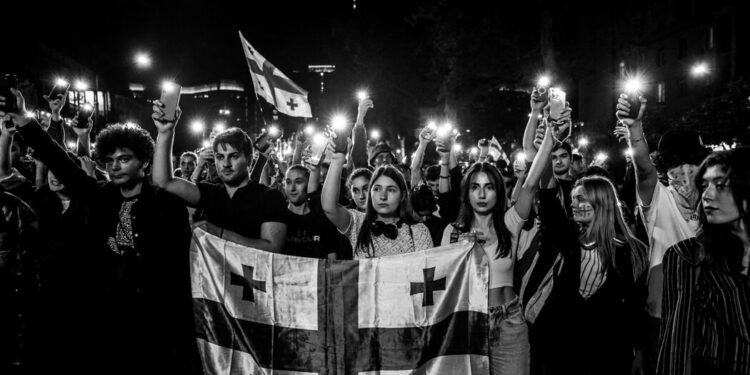For two decades, the love affair between Georgia and the West had been a passionate one.
Here in the forbidding geography of the Caucasus — surrounded by Russia, Turkey and Iran — is a small, plucky country that saw itself as part of the West. European Union flags flew in front of all government buildings even when membership in the bloc seemed no more than a fantasy. Georgians, when they find out you are American, nearly always express their love of the United States and their gratitude for American support against their centuries-long enemy, Russia.
For years, that affection was warmly reciprocated in Washington, Brussels and other European capitals, where Georgia has long been a cherished partner — an inspiring example of the spread of Western values and a key strategic outpost for projecting influence deep into the post-Soviet space.
But these days, the romance is on the rocks. The ruling Georgian Dream party has become openly hostile to its Western partners. They in turn have hit back, going so far as to sanction senior Georgian officials. The tension is now reaching a peak as Georgians prepare to vote in parliamentary elections on Saturday. The United States and the European Union are opposing Georgian Dream as openly as they can, while maintaining the thinnest veneer of impartiality.
Polls here are unreliable and it is anyone’s guess who will win. Yet even if the ruling party loses, the factors that have driven the country’s turn against the West are not going away. Like going bankrupt, the collapse in relations between Georgia and the West happened gradually, then suddenly. And there’s no assurance they can be restored.
The immediate cause of the current crisis was Russia’s invasion of Ukraine. Georgian Dream took a highly cautious stance, refusing to take sides. Georgia already lost a war to Russia in 2008, and the launch of one in Ukraine rekindled fears that it could happen again.
Western policymakers were initially understanding of Georgia’s neutrality. They appreciated the country’s precarious position: After all, Georgia had no security guarantee from the West, despite years of unsuccessful efforts to gain NATO membership. Even as it tried to stay neutral in the Ukraine war, Georgia applied for — and last year received — candidate status in the European Union.
Thank you for your patience while we verify access. If you are in Reader mode please exit and log into your Times account, or subscribe for all of The Times.
Thank you for your patience while we verify access.
Already a subscriber? Log in.
Want all of The Times? Subscribe.
Source link : https://www.nytimes.com/2024/10/23/opinion/georgia-election-europe-west.html
Author :
Publish date : 2024-10-23 05:00:00
Copyright for syndicated content belongs to the linked Source.



